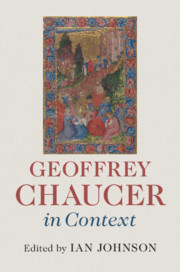Book contents
- Geoffrey Chaucer in Context
- Geoffrey Chaucer in Context
- Copyright page
- Contents
- Illustrations
- Contributors
- Abbreviations
- Introduction
- Part I Chaucer as Context
- Part II Books, Discourse and Traditions
- Part III Humans, the World and Beyond
- Chapter 19 Chaucer’s God
- Chapter 20 Holiness
- Chapter 21 Secularity
- Chapter 22 The Self
- Chapter 23 Women
- Chapter 24 Sex and Lust
- Chapter 25 Animals in Chaucer
- Part IV Culture, Learning and Disciplines
- Part V Political and Social Contexts
- Part VI Chaucer Traditions
- Further Reading
- Index
Chapter 19 - Chaucer’s God
from Part III - Humans, the World and Beyond
Published online by Cambridge University Press: 24 June 2019
- Geoffrey Chaucer in Context
- Geoffrey Chaucer in Context
- Copyright page
- Contents
- Illustrations
- Contributors
- Abbreviations
- Introduction
- Part I Chaucer as Context
- Part II Books, Discourse and Traditions
- Part III Humans, the World and Beyond
- Chapter 19 Chaucer’s God
- Chapter 20 Holiness
- Chapter 21 Secularity
- Chapter 22 The Self
- Chapter 23 Women
- Chapter 24 Sex and Lust
- Chapter 25 Animals in Chaucer
- Part IV Culture, Learning and Disciplines
- Part V Political and Social Contexts
- Part VI Chaucer Traditions
- Further Reading
- Index
Summary
Chaucer’s God considers how characters invoke God, both in terms of the everyday language of late medieval England and in the ways that the idea of God is reflected in Chaucer’s fiction. Conventional, non-theological utterances of the names for God by Chaucer’s characters as part of their, by turns, outwardly pious and unthinkingly impious phraseologies are discussed in the opening section, God Woot – ‘God knows’. Under the heading God Forwoot – ‘God foreknows’, some of the more challenging invocations of God are considered, such as the implications of divine foreknowledge and predestination on human free will in the Knight’s Tale, the Nun’s Priest’s Tale and Troilus and Criseyde. The concluding section, God in a Cruel World, asks whether in the Clerk’s Tale and the Franklin’s Tale, if Chaucer allowed his tales to reflect, and characters to reflect upon, the heretical notion of a God lacking in compassion for humanity.
- Type
- Chapter
- Information
- Geoffrey Chaucer in Context , pp. 157 - 166Publisher: Cambridge University PressPrint publication year: 2019

